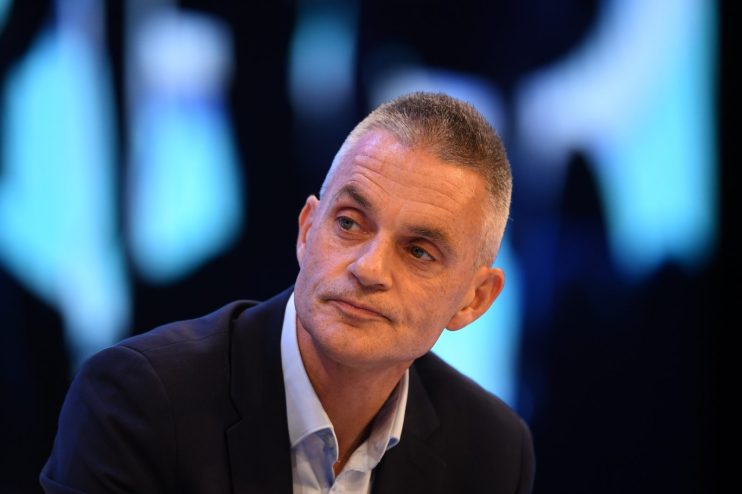Screenshot: Will Tim Davie win the generation game?

A weekly column from City A.M. bringing you all the biggest stories and trends in technology, media and telecoms
This week:
** Media Moment of the Week: A sorry soy saga
** Tim Davie and the BBC’s tug of war
** The tech titans’ tumultuous year
Media Moment of the Week
This week it’s another social media facepalm moment. This classic of the genre comes from the Department for International Trade which, in a desperate bid to appear relevant, concocted a mangled reference to the Great British Bake Off while showing off about the UK’s newly-signed trade deal with Japan.
The issue? It spelled ‘soy’ wrong, we currently have zero tariffs on soy sauce through the EU’s trade deal with Japan and most of the soy we import doesn’t come from Japan anyway. Otherwise, great tweet.
Tim Davie’s generation game
It’s been brewing for a while, but the BBC has now published its new social media policy and, well, it doesn’t disappoint.
The overhaul bans presenters from sharing their personal views on politics, public policy, or anything that could be deemed controversial (which, frankly, rules out quite a lot). It also explicitly bans virtue signalling, tells stars not to put their personal brand ahead of Auntie, and gives a solemn warning about the dangers of emojis. In addition, the Beeb’s top talent will now have to disclose how much they earn from lucrative corporate gigs on the side.
The reforms are a significant first move by new director general Tim Davie, who has pledged a renewed commitment to impartiality. By making early and decisive changes to BBC policy, the new boss is setting out his stall and sending a clear signal to the broadcaster’s detractors.
But here’s the problem: Davie is fighting a war on multiple fronts. On the one side, he’s tackling accusations of bias from vocal (largely older) critics on the right. These are the people trying to usher in a more right-leaning chair and who, potentially, have the power to pull the BBC’s funding out from under its feet.
Yet at the same time, the new boss has to contend with declining audience numbers among younger viewers. Unless the BBC can convince a generation that has grown up on Youtube and Tiktok that its relatively analogue services are worth the licence fee, the cash will soon start to dry up.
So the new director general is in the middle of a generational tug of war, being pulled one way by dissatisfied older viewers and by apathetic younger viewers the other.
The question, then, is how Davie reconciles the two. With the BBC’s finances already under strain, it seems nothing short of a radical overhaul is in order. Davie is likely to use his experience leading BBC Studios to expand the broadcaster’s income from commercial ventures. He may also take a more cut-throat approach to the business, overseeing a slimming down of the corporation’s services.
Whatever he does, though, Davie will constantly need to juggle the conflicting needs and demands of two very different demographics. It’s an unenviable task, but one the new boss seems determined to tackle head-on.
The tech titans’ tumultuous year
It’s really quite a strange time to be a tech giant, isn’t it? I’ve written at length here before about how the net is closing in on Big Tech as politicians, regulators and even the general public begin to reassess their view of Silicon Valley’s most powerful denizens.
Indeed, there was more of that this week. In the US, content moderation was top of the agenda as the bosses of some of the biggest tech firms (including Jack Dorsey in full desert island chic) appeared in front of a Senate committee to face a grilling over how they police their platforms.
Meanwhile in the EU, competition tsar Margrethe Vestager unveiled new proposals to ban tech firms from unfairly promoting their own services and force firms to better police their platforms.
And yet, as if oblivious to all this, the tech titans last night published stellar results, smashing sales records as they continue to cash in on the Covid-19 crisis. (Here’s a rundown of the figures for Alphabet, Amazon, Apple, Facebook and Twitter. I know, what a day to be a tech reporter, eh?)
Of course, the two things are not unrelated. Our increased reliance on tech during the pandemic has at once lined pockets in Silicon Valley and opened our eyes to its flaws. But while the regulatory threat looms large, last night’s figures are a timely reminder that Big Tech’s party isn’t over yet.
The algorithm recommends
- There was some good news in the book world this week, as publisher Bloomsbury posted its biggest first-half profit in 12 years. The company credited lockdown for the strong performance and, interestingly, it was a string of titles about race that dominated the bestseller charts.
- Channel 4 has returned fire after a minister hinted it could be in line for privatisation. The Bake Off broadcaster said it would end the year with a financial surplus after ad revenues bounced back strongly.
Got a story? Drop me a line at james.warrington@cityam.com or on Twitter